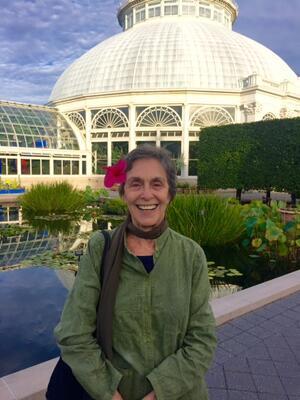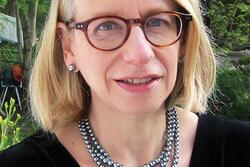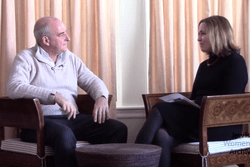An Interview with Alix Kates Shulman
In 1972, founding second-wave feminist Alix Kates Shulman published her bestselling debut novel, Memoirs of an Ex-Prom Queen. Following a young midwestern Jewish woman named Sasha Davis, Prom Queen bears witness to the exhausting, invasive, and often violent experience of becoming a woman, and is widely identified as the first important novel to emerge from the Women's Liberation Movement. When it was published, Cosmopolitan decreed it “A vicious little gem of a novel” and forty-four years later, its finely sharpened points continue to perforate the facade of femininity so often sold to women. JWA spoke to Alix Kates Shulman about Memoirs of an Ex-Prom Queen turning forty-four, the politics of aging, the importance of mass movements, and her advice for young writers.
Memoirs of an Ex-Prom Queen was published almost 45 years ago, in 1972. If you were to write this book today, what sort of situations would Sasha have to navigate? What do you think would change? What would stay the same? Would you still publish the story as a memoir, or are there other mediums (web series, miniseries, etc.) that might show another dimension to the story?
Memoirs of an Ex-Prom Queen (a novel, not a memoir, by the way) has been optioned for movies and TV a number of times, though it is not currently under option. I continue to have the fantasy that one day I will see it on a screen. However, I am a prose writer, not a filmmaker or screenwriter. When I wrote about Sasha I knew well the situation of young women, but today I am far from their experience, so I must read rather than write about it. The novel I am now writing is about radical feminist activists in their old age. It is the situations my characters must navigate that I think about now—agism, sexism, obsolescence, end of life—which overlap the situations faced by me, my friends, my generation.
The book opens with a quote from Emma Goldman about giving a political talk and being worried that someone would attack her face. Why did this quote resonant with you when writing Prom Queen? As a Goldman scholar, do you see any connections between Emma and Sasha? What about between your writing of this book and Emma’s anarchism?
Before I wrote fiction I wrote a biography of the anarchist-feminist Emma Goldman. I was bowled over by the fact that even a woman as tough, independent, & political as Emma was also, as a sexual being who practiced and advocated “free love,” instinctively concerned about her face, her looks. Even Emma Goldman! That fact fit right into the beauty theme of my novel, how important it is to women, so I used the quote from her autobiography about her face as my epigraph. As for the connection between Emma and me and Sasha, the process of writing a biography taught me to think hard about the shape and meaning of an individual life and how to present it as a compelling story. Once I knew that, I felt confident that I could create a fictional life. (I’ve examined the influence of Emma Goldman on me and on my writing in the essay, “Living Our Life,” which appears in my 2012 collection A Marriage Agreement and Other Essays.)
Sasha’s meditations on beauty and self-definition flood the novel. At the beginning she tells the reader, “My mirror image always had to be interpreted. And for that, I sought my reflection in someone else’s eyes.” The genre of the memoir similarly connotes an act of reflecting, but it seems to be one of ownership, of owning one’s experience. Could you speak a little bit more to the ideas of beauty, self, and self-articulation in the novel?
My inspiration for the novel came from my participation in the first national demonstration of the women’s liberation movement: the 1968 protest against the Miss America Pageant, in Atlantic City, that symbol of traditional white beauty standards. That protest brought women’s liberation to national attention for the first time. In my novel I imagined the way girls are judged at a prom to be similar to other beauty pageants. Starting there, I wanted to explore the many other ways in which society’s dominant attitudes toward girls and women limit our opportunities and possibilities—starting in childhood and on through education, jobs, sexual relations, marriage, motherhood.
By following Sasha’s life, from girlhood to motherhood, the reader can see that she is constantly trapped and disempowered by men’s sense of sexual entitlement, from the third grade boys in her class, to her father’s criticism of her skin, to the old millionaire who tries to kiss her, to her husband becoming distraught over her haircut. Why do you think the woman’s body and female beauty can be seen as public domain? Do you feel that Sasha was able to reclaim any parts of herself throughout the novel?
You ask: “Why do you think the woman’s body and female beauty can be seen as public domain?” Because for millennia that is how the dominant culture considered and treated women’s bodies and labor. It was an unquestioned given, as I tried to present in the novel. As a feminist, I believe that individuals on their own cannot change the culture; individual solutions don’t have traction. It takes a mass movement to really change things. That’s why Sasha’s hopes are so often dashed. Yet despite the sexist difficulties Sasha encounters at every turn in her life, she never gives up trying. I imagine—and hope my readers do too—that after the last page things will change for her. (On the last page of the novel I tried to hint at the possibility of change to come.) In the next novel I wrote, Burning Questions, I explored how such changes could occur and what they might look like. Even though the two novels have different characters, I think of them as a kind of pair: Before and After feminist awakening.
When Roxanne becomes pregnant, she and Sasha search for a “sympathetic obstetrician” and Roxanne tells Sasha to “Pick a Jewish name.” This is one of the few times where Jewish identity is explicitly expressed in the novel and it is a moment where these two women are trying to get as much bodily autonomy as they can. Finding a Jewish doctor becomes a small bit of independence. In what way did your own identity, as a Jewish feminist, impact how you wanted to tell this story?
In this novel I was far more interested in middle class white female experience than in a more narrowly ethnic one. But there is an early scene in the book when the child Sasha attends a Reform Jewish Sunday school, which awakens her earliest interest in philosophy through her questioning the existence of God.
At one point in the novel, Sasha discusses her marriage, saying, “He believed he had married an impulsive girl, even a supergirl, but not a separate feeling woman.” How did these ideas of male ownership and female disempowerment impact your own relationships? With the rise of paternity leave and discussions about mandated paid maternity leave, do you feel parents’ roles have changed since Sasha’s time?
I personally was no less subjected than any other girl to all the restrictions imposed by a sexist society, in relationships and everything else, until I was walloped by the ideas of the women’s liberation movement. In answer to the question of how things have changed since I wrote that novel: again, I must leave it to today’s young parents and readers to decide how relevant Sasha’s experience is to their own.
When Prom Queen turned twenty-five you wrote in the new introduction that you weren’t sure if its continued success was a sign of personal triumph or political defeat. Now, another generation of young feminists finds resonance with Sasha. For you, what does that signify about gender and feminism in America? Have the older issues persisted or have newer ones cropped up? Do you think that the power dynamics Sasha faced are still present and prescribing how women should dress and behave?
I have thought a lot about the question of how history moves, how change comes about. Certainly, much has changed, but just as certainly, much has not. Each generation must define the problems anew, from their own observations and experience. (I have a brief essay, “The Kenning,” on this question, too, in my 2012 collection A Marriage Agreement and Other Essays.)
In Prom Queen's long career, have you noticed any change in what strikes your readers? Do different parts seem to resonate with different generations?
Once a writer has published a book, it belongs to its readers. Many of today’s readers of my work are probably more sophisticated and knowledgeable about what used to be called The Woman Question than were my earliest readers, so I leave it to them to tell me what parts of the novel most resonate for them today. At a time when women justices sit on the Supreme Court and a feminist is running for President, yet women’s and minorities’ rights are under renewed attack, the poor and rich are ever further apart, and beauty counts as much as ever, I am very glad that Memoirs of an Ex-Prom Queen continues to attract new readers and moves them in both new and old ways.
In your interview with Makers, you say that you felt compelled to write by a sense of urgency. Is there anything happening now that you feel urgent about? Do you have any advice for young writers who similarly feel a sense of urgency?
Everything seems urgent! At 83, I am currently writing my sixth novel, about, among other things, old age, and I am also, as co-editor, putting together The Library of America’s large documentary anthology, Writing The Women’s Movement. As someone with a lot of years and history behind me, including as a participant in that world-changing freedom movement, I feel both especially qualified to undertake these tasks and a sense of urgency about completing them while I am still able and engaged. To help me, I keep in mind Rabbi Tarfon’s ancient wisdom that “you are not required to complete the task, but neither are you free to abandon it.” Let this be my advice to young writers, too. Keep writing and never give up.







